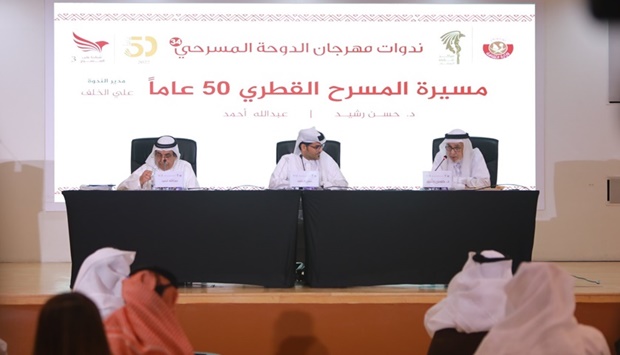The Ministry of Culture's Theatre Affairs Centre organised a forum on 50 years of Qatari Theatre Monday as part of the ongoing Doha Theatre Festival.
The forum hosted a number of the pioneers in the field who helped establish the theatre in spite of challenges like limited resources, especially during the late 1960s and the early 1970s.
The forum was moderated by Ahmed al-Khalif, and the speakers were two of the pioneers in the field with extensive experience and remarkable records of achievements – Dr Hassan Rashid and artist Ahmed.
Dr Rashid, a renowned literary critic, thanked HE the Minister of Culture Sheikh Abdulrahman bin Hamad al-Thani for his efforts in reviving the theatre festival in particualar and the theatrical movement in the country in general.
He pointed out that the Qatari theatre has enriched both the GCC and Arab artistic field throughout the past 50 years, with its various distinctive works that handled issues related to the lives of people as well as general issues.
Dr Rashid said that progress of theatre in Qatar started in the 1970s with the efforts of young fans who used to perform at school or at sport clubs.
The activities generated interest among the people as audience and as participants.
"Some of the pioneers of the first generation then travelled to Kuwait and Cairo, to benefit from the deep and extensive theatrical activities in those places during the 1970s,” Dr Rashid said. “When they returned to Doha, more mature works were performed with Qatari authors coming up with different topics that engaged the people, and they were a true theatre movement."
Similarly, artist Ahmed, with a long history of works in the field and a witness to the development of Qatari theatre, explained how the first performances were held, like preparing the stage, producing the script and the participation of the actors, and how the organisers exerted great efforts to introduce their work to the public which was eventually crowned with remarkable success.
He said that during the 70s, Qatari theatre started to grow steadily with at least four active troupes presenting 4-5 diversified plays a month and two shows every week.
Ahmed noted that the resources were limited but the enthusiasm of the theatre lovers was great.
He said that in the 1970s, there were many summer cinema halls in Doha, so he and his colleagues rented one of these and set up the stage which they called Najma Theatre, with a hall big enough for 350 spectators.
This theatre, he recalled, saw immense success, and was able to further attract more work in the field.
He also detailed the achievements of Qatari theatre, which included winning prizes in festivals held in Syria and other places during that period.
All the participating artists at the forum, including the pioneers, stressed the need to do more to further revive the golden days of Qatari theatre.
The forum hosted a number of the pioneers in the field who helped establish the theatre in spite of challenges like limited resources, especially during the late 1960s and the early 1970s.
The forum was moderated by Ahmed al-Khalif, and the speakers were two of the pioneers in the field with extensive experience and remarkable records of achievements – Dr Hassan Rashid and artist Ahmed.
Dr Rashid, a renowned literary critic, thanked HE the Minister of Culture Sheikh Abdulrahman bin Hamad al-Thani for his efforts in reviving the theatre festival in particualar and the theatrical movement in the country in general.
He pointed out that the Qatari theatre has enriched both the GCC and Arab artistic field throughout the past 50 years, with its various distinctive works that handled issues related to the lives of people as well as general issues.
Dr Rashid said that progress of theatre in Qatar started in the 1970s with the efforts of young fans who used to perform at school or at sport clubs.
The activities generated interest among the people as audience and as participants.
"Some of the pioneers of the first generation then travelled to Kuwait and Cairo, to benefit from the deep and extensive theatrical activities in those places during the 1970s,” Dr Rashid said. “When they returned to Doha, more mature works were performed with Qatari authors coming up with different topics that engaged the people, and they were a true theatre movement."
Similarly, artist Ahmed, with a long history of works in the field and a witness to the development of Qatari theatre, explained how the first performances were held, like preparing the stage, producing the script and the participation of the actors, and how the organisers exerted great efforts to introduce their work to the public which was eventually crowned with remarkable success.
He said that during the 70s, Qatari theatre started to grow steadily with at least four active troupes presenting 4-5 diversified plays a month and two shows every week.
Ahmed noted that the resources were limited but the enthusiasm of the theatre lovers was great.
He said that in the 1970s, there were many summer cinema halls in Doha, so he and his colleagues rented one of these and set up the stage which they called Najma Theatre, with a hall big enough for 350 spectators.
This theatre, he recalled, saw immense success, and was able to further attract more work in the field.
He also detailed the achievements of Qatari theatre, which included winning prizes in festivals held in Syria and other places during that period.
All the participating artists at the forum, including the pioneers, stressed the need to do more to further revive the golden days of Qatari theatre.

